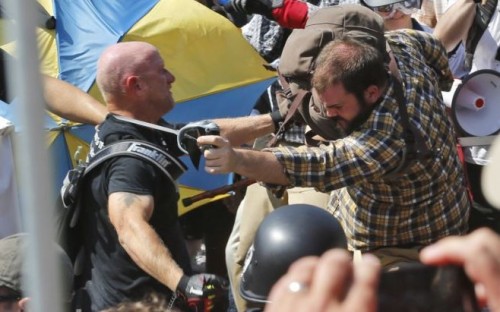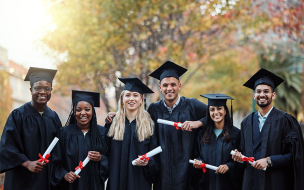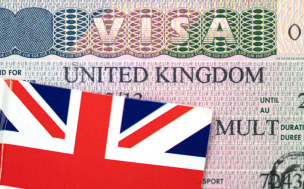On the Friday night, a few hundred alt-right protestors gave an indication of what was to come. They processioned across the University of Virginia’s campus, holding burning torches, descending on Charlottesville for an anti-immigration rally dubbed ‘Unite the Right.’
It was a surreal site—grown men espousing their version of America’s history and ideals, doing Nazi salutes. Put into words, it almost sounds comic.
But the implications were far from it. One person was killed when a car plowed into a of counter-protestors. Two state troopers died when their helicopter monitoring the demonstrations crashed. At least 34 others were injured in violent clashes over the weekend.
For many MBA students arriving on campus for the first time, it came as a shock.
Reaction on the ground
Sam Qiu, set to begin a full-time MBA program at the University of Virginia’s Darden School of Business, arrived the weekend before the Charlottesville violence for a two-week pre-MBA boot-camp. At noon on Saturday 12th, he went to Emancipation Park to support the counter-protest.
“By the time I got there, there had been signs of civil unrest,” he says. “The police were blocking off the area—with riot gear and armored trucks. The alt-right movement were also dressed in riot gear with shields and bats.

“There was a lot of anger, both from alt-right side and from people who condemn their viewpoint. It was a very tense environment.”
Sam worked as an attorney, a public defender, for five years before business school. He’s involved in the labor movement, committed to supporting disenfranchised groups. He applied to Darden with the goal to get into strategy consulting.
“One of the things that drew me to Darden was the fact that it’s in a nice secluded community, unlike what’s being portrayed in the media,” Sam explains.
“As far as the protest is concerned, these were people that travelled from outside Charlottesville to Charlottesville to disrupt.
“I believe that the alt-right movement tries to poison the well,” he continues. “They take positions that are not mainstream and not acceptable to many in this country. They’re not an accurate representation of what Charlottesville is.”
A community united
On the Monday following the violence, the business school organized a forum for students and staff to come together and reflect on the weekend’s events. The University of Virginia—founded by Thomas Jefferson in 1819—has brought a specialist psychologist on campus to help students dealing with any emotional trauma.
“There’s been a lot of concern,” says Sam. “There’s definitely a lot of people that don’t understand why this happened in our community.
“But also, throughout this tragedy, a lot of students have banded together. There’s been an outpouring of support for minority students.
“We have this collegiate atmosphere where no man is going to be left behind. On Thursday night [17th], one of the international students from Germany had a housewarming party and 100 people showed up—there’s a feeling of inclusion that I didn’t feel at law school.”
Sam is part of The Consortium, and organization and network committed to increasing the representation of African Americans, Hispanics, and Native Americans at business schools and in corporate America.
20% of the 345 students in the Darden MBA class of 2018 are from domestic minorities. Around 30 are Consortium students. 33% of Darden MBA students are international.
Wider implications?
Still, competition in attracting applicants, particularly international applicants, to business school is the US is fierce. In the political climate of intolerance and fear, some schools are struggling.
According to a recent survey by admissions firm Stacy Blackman Consulting, 80% of applicants think Donald Trump’s stance on immigration will reduce the diversity of US business schools.
Barbara Coward, an expert b-school admissions consultant, thinks events in Charlottesville could have wider implications for schools across the American South.
“The impact has been felt as far as 10,000 miles away,” she says. “I know of examples of potential MBA students in Asia, specifically India, who are scared.
“Earlier this year, it was about the United States, as a whole, because of worries about discrimination after the election. Since Charlottesville, there’s a more focused concern about safety in the South. For some overseas applicants, it has influenced their shortlist of schools.
“When you think about it, the decision to leave the security of a current position to attend business school on a full-time basis presents a baseline of risk and uncertainty,” she continues.
“The hatred and violence on August 12th amplifies this anxiety. It’s not surprising that an international applicant would look at business schools in other areas of the country where their personal security feels more certain.”
At the center of it all are statues. White nationalists descended on Charlottesville to protest the city’s plan to remove a statue of Confederate General Robert E. Lee from Emancipation Park.
In the last few days, universities have taken proactive measures to avoid repeat events. Duke University removed a statue of Robert E. Lee from campus after it was vandalized. The University of Texas at Austin removed four statues of Confederate leaders—including Robert E. Lee—overnight.
Normal life resumes

At Darden, normal MBA life has resumed. Josep Martínez Pascual has just returned from an internship in London to start his second MBA year. Originally from Barcelona—itself a victim to terrorism in recent days—Josep is a former professor at the city’s ESADE Business School.
Away from Charlottesville, Darden staff kept him updated on events in the city. A few days after arriving back on campus, he’s not concerned.
“Darden is a very open and diverse community—very concerned with integrating people with different backgrounds. What happened is not representative of Darden at all,” he says.
“I can understand that people might be worried, but there’s no reason to be. We’re not really worried that this will happen again.”
Barbara agrees. She says international applicants considering an MBA in the American South should not be put off by recent events:
“My advice is to be open with admissions offices about your concerns, and to also talk to current students on campus from your country who can listen and provide support.
“There’s never been a more important time for future leaders to build a better society. Don’t let fear get in the way of getting the skills that can contribute to profound social change.”
RECAPTHA :
c0
fb
ca
c6










